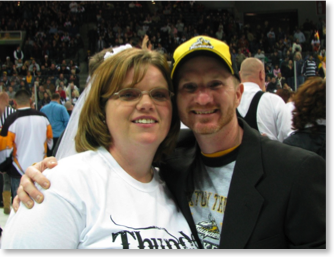This is dedicated to all of my friends and former colleagues who have recently been given lay off notices. They are some wickedly talented people and I wish them all the best.
On the US jobs front, this has been an ugly week, and it's only Tuesday. So, here are three things I believe to be true:
1. Unemployment is high.
2. The economy is in the the tank.
3. There are jobs out there!
Yesterday, 7 companies announced a total of 71,400 job cuts. Today, another 11,500 were lost. With over 218,000 announced layoffs since January 1 this is shaping up to be a very tough year. In the financial services industry alone, there have been over 230,000 jobs lost since November 2008.
The Bureau of Labor Statistics reported today that the national unemployment rate rose from 6.8 to 7.2 percent. California had the highest increase (9.3 percent in December) while Michigan had the highest overall (10.6 percent).
I could have become one of those unemployed.
In September of last year, the bank I worked for failed, was taken over by the US government and then sold off to a competitor. Many of my friends and colleagues there told me they were nervous because they hadn't updated their resume in years. Some did not remember how they got this job and felt as if they were not well equipped to get a job in today's market. At this company, I had the honor of working with some very bright and strong people. Even some of the most talented professionals I knew were more than a little underprepared. Hundreds of people were registering forLinkedIn for the first time, even those that were against it when times were good.
Because I was prepared, I quickly found a new job.
One week after I started that new job, 1,500 of my former colleagues were handed lay off notices.
Going through this solidified my long-held belief that preparation is key to success in a job search.
Regardless of your current employment status, there are things you can do help prepare you in your career search now and in the future. To summarize something Mike Auzenne from Manager Tools has said; the time to search for batteries for the flashlight is not at the moment when the power goes out. Preparing for a career search is rarely taught and does not come natural to us flawed humans. Don't wait until you have to find a job to figure out how you'll find a job.
In his podcast, How I Got My Job, Daniel Johnson, Jr. interviews people about the steps they followed to get their current or past job. Across all of the interviews, there are a myriad of different things people did to land their job. One thing is clear, though, they didn't wake up in the morning, open their front door and find that job waiting on the porch for them. Different people have different circumstances but it seems the old adage applies to job seeking - Luck is where opportunity meets preparation.
In another resource, Career Opportunities, a blog and podcast by Douglas E. Welch he offers practical tips to improve your career and your search. Douglas’s work shows that there is great value in always working to “sharpen the saw”.
Over the last couple of months I have changed careers and have seen a number of friends and former colleagues do the same. Of course, the job market is tightening but there are still jobs to be had. Now, more than ever, is the time to differentiate yourself from the rest of the pack.
Through the years, here are some of the things I've learned that have help me.
It's all about the people.
Build meaningful professional relationships. When I hear "network" used as a verb I think of an IT guy pulling cable and connecting computers. Build meaningful professional relationships, don't waste your time "networking".
Too many people ignore the value of professional relationships until they really need help. Building meaning relationships is like saving for retirement. Don't decide you need to start contributing to your 401k a month before you plan on retiring, unless you want to be broke. Likewise, don't think that taking someone's business card means that person owes you a favor (or a job). Meet people. If you only know people you work with, look for opportunities to meet and interact with people outside your company, in your industry or in your same geographical area. Relationships, like your retirement, take time to grow and foster. Always ask, "What value can I offer someone" before you expect others to deliver value to you.
Know what's out there.
My first paying job was as an Advertising Clerk for Catalyst Personnel. At the ripe age of 12, I was responsible for clipping help-wanted advertisements for my Aunt Kelly's staffing company. I was paid $1 for each of her ads I clipped, taped to a sheet of binder paper and placed in a binder along with the date and name of the publication. She only ran ads on Wednesdays and Sundays and would have anywhere from 5 to 25 openings advertised. I had to scan each column to look for her business name.
Aunt Kelly taught me a valuable lesson. She taught me that reading help-wanted ads every week was better than reading the business section in the local newspaper. I continued to read local help-wanted ads until just a couple of years ago. After more than twenty years of reading the classified section I had a pretty good idea who was hiring and when. As I built my professional network I began to ask people in those companies who was hired and where they came from. When that person left the company or moved to another position the ad would pop back in the newspaper and the cycle began anew.
Even though I am very happy in my new job and have no desire to leave, I still spend a little time every other week or so looking to see what jobs are out there. Well, believe it or not, sometimes I learn that a company is hiring because of a story in the local paper. I still scan Monster, HotJobs and even my local paper. I have also found value in having a premium membership at TheLadders. Over the last few years I have also developed relationships with a handful of very talented recruiters. I make referrals when I can and always have "my ear on the street".
This step, looking when you don't need to be, seems to be the most forgotten. For many, it might be the feeling of guilt that prevents someone from looking but realize that I suggest looking, not necessarily applying. Simply knowing what companies are hiring in your area is an advantage over having no idea.
If you are wonderfully happy and successful in your current position, congratulations! Still, you need to look out in the market and see what else is out there. Don't wait until you're unemployed to find out who's hiring in your town, your field or your industry.
Learn how to prepare for the search, interview and offer.
Just like get-rich quick books clutter the shelves at Borders, there is no shortage of how to interview resources out there. Some claim to give you all the right answers and land that perfect job. Preparation is more than trying to figure out the secret questions the interviewer might ask.
Manager Tools has a series of podcasts and resources that teach, step-by-step, how to become a more effective job-seeker, from your resume and cover letter, working with recruiters, interview preparation and even how to accept an offer.
I was raised by a Certified Employment Specialist who had a phenomenal career as a resume writer and employment consultant. My Mother spent decades learning the craft of interviewing and job placement. With thousands of clients all over the world my Mother was considered an expert by many. When most kids were playing baseball or learning to play a musical instrument (that they would grow up hating to play and then regretting they didn't stick with) I was learning how to write a cover letter, how to follow up after an interview and how to get a job!
Having said that, I still say that there is no resource as good as Manager Tools. Their Interviewing Series truly is the best definitive resource out there to make your search more effective. It will take work on your part. It is not, after-all, a magic cure-all pill. Invest the time to go through all of it and you'll find you're getting more interviews and more offers!
Often, job seekers apply the same logic that got them their very first job throughout the rest of their career. That is clearly a big risk. Preparation is vital. Build strong professional relationships. Know what’s out there. Learn about the process.
Don’t get caught up in the negative press. There actually are jobs available right now. Finding your next job, especially in this market, might prove tough. You’ll need to work hard at it and that hard work starts with preparation.
Stay positive, keep looking, never stop looking.
 We watched the first period on TV in the large banquet room and then made our way out on to the ice. With a fight in the first couple of minutes and a 3-0 lead, the Thunder had done more than there share getting the crowd excited.
We watched the first period on TV in the large banquet room and then made our way out on to the ice. With a fight in the first couple of minutes and a 3-0 lead, the Thunder had done more than there share getting the crowd excited. Thanks to Tony, Mike, Shauna, Christian, Rachel, Emily, Makenzy, Jack, Rita, Ken, Megen, Kenny, Missy, Dad, Angela, Tom, Tom, and Justin for coming out and sharing our special night with us.
Thanks to Tony, Mike, Shauna, Christian, Rachel, Emily, Makenzy, Jack, Rita, Ken, Megen, Kenny, Missy, Dad, Angela, Tom, Tom, and Justin for coming out and sharing our special night with us.


